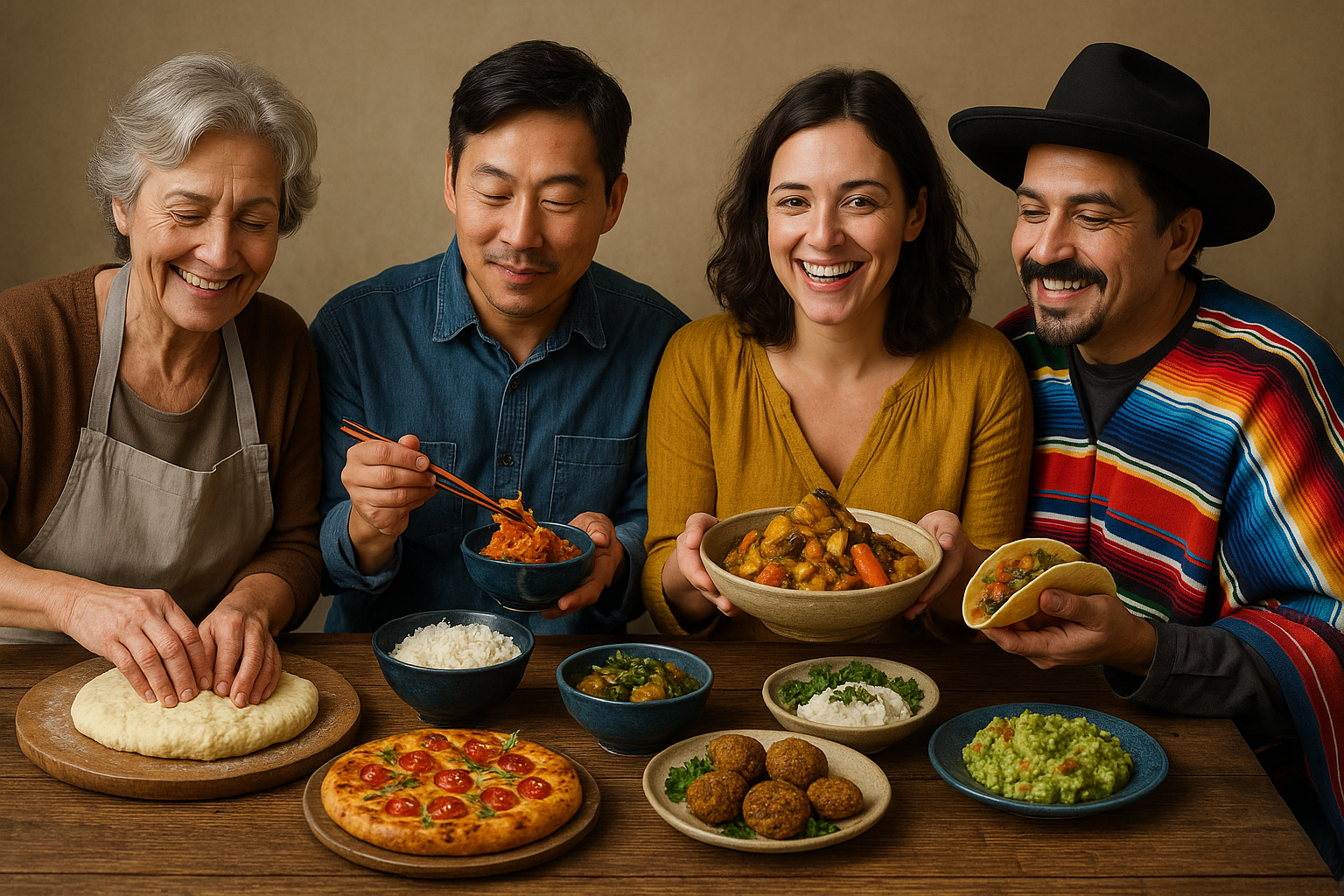The Bonds Between Food and Cultural Identity
Across continents and centuries, food has stood as one of the core pillars sustaining cultural identity and heritage. The simple act of preparing treasured family recipes—like kneading dough for Italian focaccia, slow-cooking a Moroccan tagine, or fermenting kimchi in Korean households—offers a sense of belonging and roots that words alone cannot express. These foods are rituals repeated through generations, adapted with local ingredients, and passed along with pride and nuance. For travelers and culinary enthusiasts, figures like Claudette Spinelli represent the bridge between taste and tradition, showcasing how food connects people to places and their history. Sharing a meal abroad can be a profoundly personal exchange, inviting outsiders to participate in local customs and values.
It’s through the communal aspects of food—breaking bread, sharing a bowl of rice, or toasting with regional wines—that communities mark occasions, mourn losses, and celebrate triumphs. Even in the most remote villages, hospitality is often measured by what is set at the table. A dish’s ingredients, preparation, and even presentation can illuminate a region’s religious beliefs, available resources, climate, and collective memory. Whether sitting down for a Japanese tea ceremony or a Mediterranean seafood feast, travelers soon realize that food serves as the universal language that unites humanity across borders.

Travel as a Gateway to Culinary Discovery
The allure of travel extends beyond landmarks and landscapes; it is often driven by the desire to awaken the senses through new flavors and culinary experiences. Stepping outside one’s home country and biting into a currywurst on a Berlin street corner or sipping strong Turkish coffee beneath a bustling bazaar transports the traveler into the daily rhythm of local life. Street food, fresh market finds, and small, family-owned eateries offer a glimpse into authentic regional lifestyles, far removed from the sanitized sameness of tourist hotspots.
Even spontaneous encounters hold the promise of lasting memories—a cup of thick hot chocolate on a chilly Spanish morning or fresh papaya on a balmy Thai afternoon. Culinary discovery invites curiosity and encourages even the most reticent eaters to venture beyond familiar fare. Local guides and residents are often delighted to share their favorite stalls, regional delicacies, and secret food haunts. As Travel Weekly highlights in its coverage of Quebec, culinary travel can also serve as a powerful lens into a destination’s cultural and historical evolution, blending local flavors with centuries-old stories and traditions. True gastronomic adventure means actively seeking out what locals savor daily and learning the stories behind each unique taste.
Iconic Dishes Around the World Everyone Should Try
Some dishes have achieved iconic status not only for their flavor but also for the memories and emotions they evoke. From Vietnamese pho simmered with aromatics to French ratatouille made from sun-warmed vegetables, these meals capture the essence of a place. Sampling authentic cuisine is a highlight for travelers, serving as a delicious gateway into new cultures. For a deeper experience:
- Engage locals in conversation to discover hidden food gems far from tourist crowds.
- Visit bustling markets and community feasts, or book local cooking experiences to foster a hands-on connection with the local culture.
- Respect local dining etiquette, such as communal eating or paying homage to the chef, to immerse yourself fully in the ritual of sharing food.
Beyond flavor alone, these experiences prompt reflection on the intricate balance of tradition, geography, and innovation that shapes what’s on the plate. Culinary adventure, in turn, broadens the mind and palate, challenging assumptions and promoting a spirit of openness.
How Food Tourism Fuels Economic Growth
The expansion of food tourism is rapidly transforming how regions promote and sustain themselves. Tourists are increasingly traveling with their taste buds in mind, seeking unforgettable meals and rare ingredients, which boosts demand for local chefs, markets, and small producers. This ripple effect supports local economies by driving business to small-scale farmers, family-run restaurants, and artisanal food makers who might not otherwise attract attention. It helps preserve agricultural diversity, keeps culinary traditions alive, and sustains rural communities vulnerable to urban migration.
With the rise of food tourism, this movement has become a global phenomenon that offers both financial benefits and cultural exchange opportunities. Regions embracing culinary tourism stand out in an increasingly competitive travel industry, and travelers are now shaping their itineraries around celebrated food destinations and tours.
The Rise of Food Festivals and Culinary Events
Nowhere is the connection between travel and gastronomy more evident than at food festivals. These lively events bring together top chefs, local food artisans, and hungry travelers eager to sample the world’s bounty. Take the annual World Gourmet Summit in Singapore or lively celebrations such as Oktoberfest in Germany—festivals offer tasting sessions, workshops, cooking demonstrations, and competitions that attract thousands of visitors. They provide platforms for innovation, education, and cross-cultural interaction.
Food festivals instill a renewed sense of pride in local flavors and provide smaller producers with the opportunity to introduce their offerings to a broader audience. Experiencing the energy of such a festival is about more than just eating; it’s participating in a living, breathing tradition that connects the present with the future, sparking creativity and global conversations in the culinary community.
Mindful Eating: Sustainability and Ethics While Abroad
Conscious travel now means more than passport stamps and exotic meals—it calls for responsibility. Sustainable choices, such as eating in-season produce and reducing reliance on imported foods, help minimize one’s environmental footprint. Supporting restaurants that champion eco-friendly practices benefits the planet and preserves food culture for future generations. Ethical dining also encompasses choosing local establishments over multinational chains, selecting seafood options that are responsibly sourced, and respecting traditions that promote biodiversity preservation.
Yet, travelers must also contend with modern issues, such as food waste, which remain significant challenges worldwide. The problem of food waste is not just an ethical concern but also an environmental and humanitarian one. By practicing mindful eating—such as ordering only what you can finish, eating leftovers, or supporting zero-waste restaurants—travelers can have a positive impact on communities and set an example for others.
From Street Food to Fine Dining: The Importance of Openness
The world’s best culinary experiences aren’t reserved solely for white-tablecloth restaurants. Sometimes, the most memorable dishes are discovered in humble surroundings—a fiery empanada from a street cart in Argentina or hot dumplings from a bustling roadside shop in China. These meals reveal the spirit and creativity of a culture, allowing travelers to witness the ingenuity born from everyday life. Meanwhile, fine dining elevates local ingredients to astonishing heights, offering fresh interpretations that celebrate tradition while pushing the boundaries of taste.
Openness to trying unfamiliar dishes, textures, and preparations is fundamental to a rewarding food journey. This mindset creates space for surprise and delight and can lead to personal growth as travelers overcome hesitations or embrace new customs. True food adventurers know that the best way to learn about a place is to taste it from every angle—refined or straightforward, sweet or savory.
Sharing Gastronomic Adventures: Why Food Memories Matter
The flavors, aromas, and rituals experienced abroad have a way of becoming lifelong memories. Travelers often bring home more than souvenirs: they carry stories, recipes, and traditions that enrich their lives and relationships. Recreating a cherished meal once eaten beneath a palm tree or sharing tales of a midnight snack run in a foreign city binds friends and family closer together.
Food memories tie together emotions, adventures, and cultures. They prompt a yearning for new journeys and offer a lens through which we remember our most incredible adventures. In sharing these memories, people build bridges of understanding, appreciation, and joy, reminding us that, in all its diversity, the world shares a typical table.








